Book a dental appointment
Dental implants and implantology
What are dental implants?
What are implants, what does implantology involve and in which cases could implants be a good choice?
Dental implants are the best way to replace missing teeth, or teeth with a hopeless prognosis. A dental implant is essentially an artificial root, which is placed in the jawbone and onto which a dental crown is placed. Since a dental implant is made of titanium alloy, which regarding its properties is biologically compatible with the body’s tissues, the jawbone grows around the implant and thus it is able to replace the root of the missing tooth. Years of clinical trials confirm that implants are a safe option for replacing lost teeth.
Advantages over conventional dentures
Since dental implants are fixed in the mouth, they are literally the most secure dentures. Implants together with dental crowns are very similar in appearance and function to natural teeth. They should therefore be preferred if you want to resume a normal active life after losing a tooth. Implants with good compatibility and flexible solutions, such as Straumann implants, which also come with an international lifetime warranty and a chemically active surface, should be preferred. The active surface stimulates blood particles, making recovery from surgery faster.
Since tooth extraction is accompanied by changes in the dimensions of the jaw, which reduces the process of jaw regeneration, the implant provides the jaw with the stimulation it needs to regenerate continuously. This means that a dental implant helps to maintain the normal position of the jaw, the shape of the face and the smile. It is also important to note that implant placement puts significantly less strain on other teeth than the use of other types of dentures. While placing a dental bridge requires filing down the adjacent, sometimes perfectly healthy teeth, and sometimes root canal treatment needs to be performed on the supporting teeth, implant placement is much gentler on the adjacent teeth.
Who is suitable for dental implants?
Dental implants are suitable for almost all patients, but there are some contraindications. Implants are definitely not suitable for children, since the implant cannot be placed in the jawbone which is still growing, due to its ossification.
Implants can only be placed in a mouth with healthy teeth, which means that all cavities, root inflammations and gingivitis must be treated before the visit.
Dental implants should be considered in the following cases:
Replacing single lost teeth: usually an implant consists of an osseointegrated implant fixture, abutment that connects it with a crown and an implant crown.
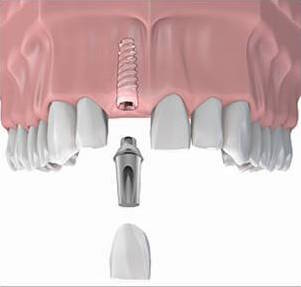
As a support to a bridge: to replace a longer toothless area.
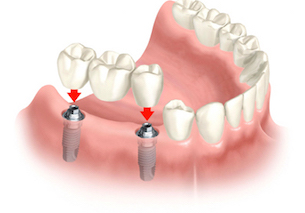
To restore the entire fixed occlusion of an upper or lower jaw:
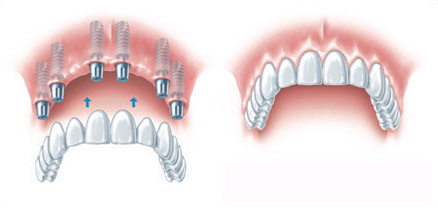
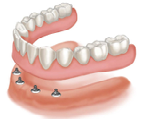

We use Straumann implants
Our clinic uses Straumann’s dental implants. Why? Because they are by far the best implants that can be implanted to our patients today. Straumann is the world’s largest manufacturer of implants and a pioneer in dental implantology, whose first implant was made already 40 years ago. The Straumann ROXOLID SLActive implant is made of an alloy of zirconium and titanium that is 30% stronger than titanium implants. Implants made of ROXOLID alloy have been scientifically proven to adjust better and faster than titanium implants. The ROXOLID alloy made it possible to make the world’s smallest implants (only 4 mm) for patients with vertical jaw deficit.
In addition, what makes this implant special is the surface that is created with the help of a special SLActive technology. The implants are produced in vacuum and stored in sealed packages filled with a special liquid, so that the implant does not come into contact with air and the unique properties of its surface do not change before implantation. The active surface of ROXOLID SLActive implants attracts and intensively stimulates blood particles that take care of the healing process. The risk of the implant not growing into the bone is reduced to zero, and the ossification time is halved.
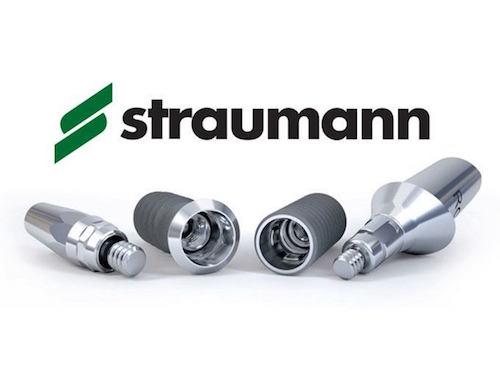
Read more:
- What is a dental implant
- The advantages of implants compared to conventional dentures
- Who is suitable for dental implants
- Examination of a patient and planning treatment
- Planning treatment
- Complications of implantation
- Caring for dental implants at home
Read more about our other dental treatment services here.
Read more about oral health here.
